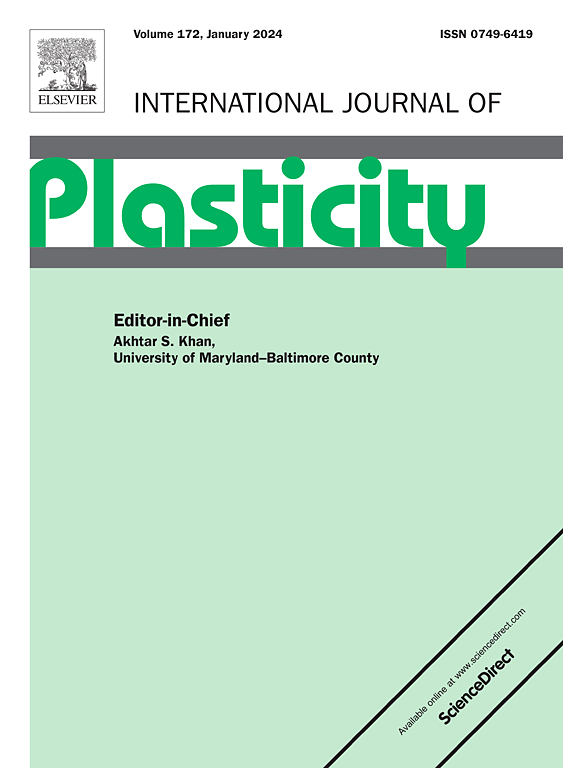Ultra-low temperature mechanical response of VCoNi medium-entropy alloy with unprecedented high strength and ductility
IF 12.8
1区 材料科学
Q1 ENGINEERING, MECHANICAL
引用次数: 0
Abstract
This work reports on the unprecedented high tensile strength and ductility of single-phase VCoNi medium-entropy alloys (MEAs) at liquid helium temperature (4.2 K) and reveals the effects of grain size on strength, strain-hardening capability, and discontinuous plastic flow (DPF) behavior at 4.2 K. The fine-grained VCoNi MEA with an average grain size of 2.2 μm exhibits exceptional yield strength of 1386 MPa and tensile stress of 1845 MPa at a high elongation of 43%. The Hall–Petch (H–P) relationship at 4.2 K for the VCoNi MEA was established for the first time, demonstrating that the yield strength enhancement with decreasing temperature primarily originates from a reduction in dislocation width, leading to an exceptionally high solid-solution strengthening contribution of 782 MPa. In addition to planar slip, nano-twinning and stacking faulting were activated at 4.2 K upon plastic deformation, contributing to a sustained strain-hardening capability. The restricted mobility of screw dislocations at 4.2 K suppresses dynamic recovery, facilitating dislocation proliferation and further enhancing strain hardening. In terms of DPF behavior, characterized by abrupt serrations in the stress-strain curves, fine-grained specimens exhibit more pronounced DPF due to the rapid accumulation of geometrically necessary dislocations. However, the maximum stress drop prior to plastic instability remains similar across all grain sizes, suggesting that dislocation density is the primary factor governing DPF behavior. These findings provide important insights into the development and mechanistic understanding of ultrastrong and ductile alloys for applications at extremely low temperatures.

具有空前高强度和高塑性的VCoNi中熵合金的超低温力学响应
本文报道了单相VCoNi中熵合金(MEAs)在液氦温度(4.2 K)下具有前所未有的高拉伸强度和延展性,并揭示了晶粒尺寸对强度、应变硬化能力和不连续塑性流动(DPF)行为的影响。平均晶粒尺寸为2.2 μm的细晶VCoNi MEA屈服强度为1386 MPa,拉伸应力为1845 MPa,延伸率高达43%。首次建立了VCoNi MEA在4.2 K时的Hall-Petch (H-P)关系,表明随着温度的降低,屈服强度的增强主要来自位错宽度的减小,从而导致了极高的固溶强化贡献,达到782 MPa。除了平面滑移外,在4.2 K的塑性变形下,纳米孪晶和堆积断层也被激活,这有助于持续的应变硬化能力。4.2 K时螺位错的受限迁移抑制了动态恢复,促进了位错扩散,进一步增强了应变硬化。在DPF行为方面,其特征是应力-应变曲线上的突然锯齿,细晶试样由于几何上必要的位错的快速积累而表现出更明显的DPF。然而,塑性失稳前的最大应力降在所有晶粒尺寸中仍然相似,这表明位错密度是控制DPF行为的主要因素。这些发现为在极低温下应用的超强和延展性合金的开发和机理理解提供了重要的见解。
本文章由计算机程序翻译,如有差异,请以英文原文为准。
求助全文
约1分钟内获得全文
求助全文
来源期刊

International Journal of Plasticity
工程技术-材料科学:综合
CiteScore
15.30
自引率
26.50%
发文量
256
审稿时长
46 days
期刊介绍:
International Journal of Plasticity aims to present original research encompassing all facets of plastic deformation, damage, and fracture behavior in both isotropic and anisotropic solids. This includes exploring the thermodynamics of plasticity and fracture, continuum theory, and macroscopic as well as microscopic phenomena.
Topics of interest span the plastic behavior of single crystals and polycrystalline metals, ceramics, rocks, soils, composites, nanocrystalline and microelectronics materials, shape memory alloys, ferroelectric ceramics, thin films, and polymers. Additionally, the journal covers plasticity aspects of failure and fracture mechanics. Contributions involving significant experimental, numerical, or theoretical advancements that enhance the understanding of the plastic behavior of solids are particularly valued. Papers addressing the modeling of finite nonlinear elastic deformation, bearing similarities to the modeling of plastic deformation, are also welcomed.
 求助内容:
求助内容: 应助结果提醒方式:
应助结果提醒方式:


